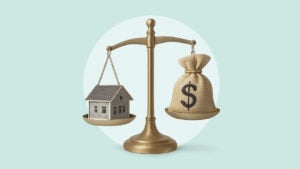I’m well into paying off my mortgage. Should I still refinance?




Key takeaways
- Refinancing your mortgage when your loan is almost paid off might make sense if your break-even period is less than two years away.
- Doing a cash-out refinance could also make sense, even if you’ve paid off a chunk of your loan balance.
- Making extra mortgage payments can help you save money on your mortgage without refinancing.
If you’ve paid off half — or more — of your mortgage, you might face a dilemma: Does it make sense to refinance? Not always. The costs and stress of refinancing could outweigh — and, in some cases, actually negate — any potential savings. Here’s how to do the math.
Should I still refinance if I’ve paid off most of my mortgage?
Whether or not it makes sense to refinance your mortgage when you’ve already paid off a significant amount depends on your situation and plans for the future. It might make sense to refinance if:
- You can lock in a lower interest rate and reduce your monthly payment.
- You’re planning to stay in the home for a long period of time.
- You want to do a cash-out refinance and use the money for other purposes.
However, refinancing your mortgage when you’ve paid most of it off isn’t normally recommended. If you’re hoping to pay off your loan more quickly, there are potentially better strategies than refinancing.
Refinancing to get a lower interest rate
For many people, lowering their monthly payments is the main goal of refinancing. If you can qualify for a lower interest rate and save money without lengthening your loan term, this could be a good strategy. But you should calculate your break-even point first — there’s more on that below.
However, if you need to lengthen your loan term in order to lower your monthly payment, know that this will cost you more in interest in the long run. If you’re unable to afford your monthly payments, consider a loan modification rather than a refinance.
Refinancing to get cash
A cash-out refinance lets you trade in some of your home equity — usually up to 80 percent of it — in exchange for cash, which you can use for things like home renovations, college tuition or debt consolidation. If you have a large expense coming up, and using your equity offers a better rate than other borrowing options, a cash-out refinance is worth considering.
If you do need money for home-related expenses, you could consider a home equity loan or a home equity line of credit (HELOC) instead of refinancing. That way, you’ll still be leveraging your ownership stake, but you’ll get to keep your original mortgage with its rate and amortization schedule.
Is it better to refinance or pay extra principal?
If you can afford it, making extra payments on your mortgage is a great way to save money on your loan. By shaving time off your loan term, you’ll save money on interest. But is making extra payments better than refinancing? That depends on the cost to refinance. Here’s how to find yours:
Evaluate the full cost to refinance
Unfortunately, refinancing your mortgage isn’t free. Taking out a new loan can cost thousands of dollars in fees, usually 2 to 5 percent of the mortgage amount.
For example, if you get a new mortgage of $150,000, you could pay between $3,000 and $7,500 to refinance. Even if you roll those costs into your new loan, you’ll have to pay them eventually, plus interest.
Find your break-even point
Because of the closing costs involved in refinancing, you won’t save money on your mortgage right away, even if you qualify for a lower interest rate. You can find out how long it will take you to realize the savings from your lower monthly payments by calculating your break-even point.
Say it costs you $6,000 to refinance your current loan, and your new mortgage will cost $300 less per month. In this case, it would take you 20 months, or a little less than two years, to break even.
According to Rocke Andrews, former president of the National Association of Mortgage Brokers, it’s only worthwhile for most people to refinance if the break-even period is two years or less. And if you plan to sell your home before you’ll break even, refinancing definitely isn’t worth it.
Shop around for the best refinance offer
If you decide that refinancing is the right choice, compare offers from multiple lenders to find the best refinance rates.
In addition to the interest rate and annual percentage rate (APR), consider the lender’s customer service and average closing times. If possible, shop around for loan offers within a short period of time to avoid a major hit to your credit score.
“The best way to compare refinance offers is with a mortgage professional,” Andrews adds. “If you’ve gotten a mortgage recently and you can lower your interest rate by 0.75 or 1 percent, then it’s usually worth it.”
Consider making extra payments on your mortgage
If the costs involved make refinancing unappealing, and if you can afford it, you can also make extra payments toward your principal and pay off your mortgage early. This will save you money in interest overall, even if you retain the same interest rate.
For example, if you’re paying 6.5 percent interest on a $150,000 mortgage balance, and you have 10 years left on your loan, you could pay about $400 more on your loan each month — about $2,900 instead of about $2,500 — and pay off your loan five years sooner. This would save you more than $125,000 in total interest.
Whether it’s smarter to refinance or pay extra toward your mortgage depends on your financial situation. Refinancing can make sense if you will hit the break-even point sooner rather than later. But if you have the money to do it, making extra payments on your mortgage could help you save money without needing to refinance.
Why we ask for feedback Your feedback helps us improve our content and services. It takes less than a minute to complete.
Your responses are anonymous and will only be used for improving our website.




